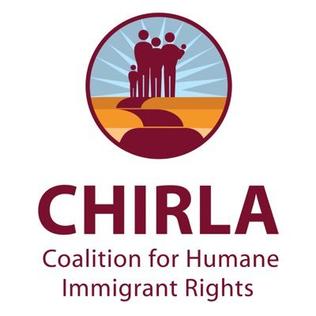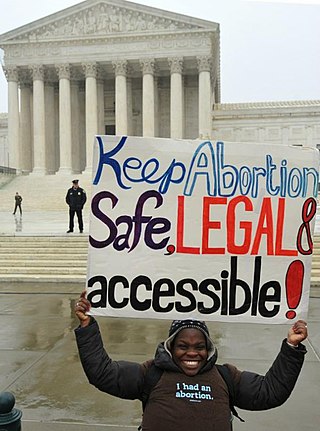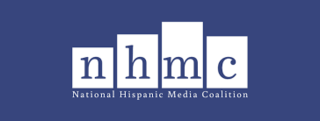Related Research Articles

The March for Women's Lives was a protest demonstration held on April 25, 2004 at the National Mall in Washington, D. C. There was approximately 1.3 million participants. The demonstration was led by seven groups; National Organization for Women, American Civil Liberties Union, Black Women’s Health Imperative, Feminist Majority, NARAL Pro Choice America, National Latina Institute for Reproductive Health, and Planned Parenthood Federation of America. The march was intended to address topics such as abortion rights, reproductive health care, women's rights, and others. Originally named the March for Freedom, the march was renamed in an effort to expand the message of "pro-choice" to include the right to have children, access to pre and post natal care, as well as sex education that were not always accessible for women of color.
The Leadership Conference on Civil and Human Rights, formerly called the Leadership Conference on Civil Rights, is an umbrella group of American civil rights interest groups.

The Audre Lorde Project is a Brooklyn, New York–based organization for LGBT people of color. The organization concentrates on community organizing and radical nonviolent activism around progressive issues within New York City, especially relating to LGBT communities, AIDS and HIV activism, pro-immigrant activism, prison reform and organizing among youth of color. It is named for the lesbian-feminist poet and activist Audre Lorde and was founded in 1994.
Unite for Reproductive & Gender Equity (URGE) is a national youth-led reproductive rights and justice non-profit organization in the United States based in Washington, D.C. that began as Choice USA in 1992. Choice USA changed its name to URGE in July 2014.

The Coalition for Humane Immigrant Rights, also known as CHIRLA, is a Los Angeles county-based organization focusing on immigrant rights. While the organization did evolve from a local level, it is now recognized at a national level. The Coalition for Humane Immigrant Rights of Los Angeles organizes and serves individuals, institutions and coalitions to build power, transform public opinion, and change policies to achieve full human, civil and labor rights. The Coalition for Humane Immigrant Rights of Los Angeles also has aided in passing new laws and policies to benefit the immigrant community regardless of documented status.

Reproductive justice is a critical feminist framework that was invented as a response to United States reproductive politics. The three core values of reproductive justice are the right to have a child, the right to not have a child, and the right to parent a child or children in safe and healthy environments. The framework moves women's reproductive rights past a legal and political debate to incorporate the economic, social, and health factors that impact women's reproductive choices and decision-making ability.

Women's Media Center (WMC) is an American 501(c)(3) nonprofit women's organization in the United States founded in 2005 by writers and activists Jane Fonda, Robin Morgan, and Gloria Steinem. Led by President Julie Burton, WMC's work includes advocacy campaigns, giving out awards, media and leadership training, and the creation of original content.

The National Hispanic Media Coalition (NHMC) is a nonprofit 501(c)(3) civil rights organization active in the United States that was founded to eliminate hate, discrimination, and racism towards the Latino community.
Women Deliver is a global advocacy organization that works to generate political commitment and financial investment for fulfilling Millennium Development Goal 5, an initiative focused on improving maternal health. The organization is based in New York and uses a multifactorial approach involving access to a healthy diet, clean water and sanitation, health services, and appropriate education during pregnancy and childbirth. It is targeted towards reducing maternal mortality, achieving universal access to reproductive health, and improving the lives of girls and women globally.
The Hispanic Federation (HF) is a U.S based non-governmental organization focused on supporting Hispanic communities through local, state, and national advocacy. The Federation was founded in New York City in 1990 by a small group of Latino leaders, establishing initiatives to advocate for the interests of the Hispanic community and has expanded to establish programs, and policies in 16 states. The organization's objective is to empower and advance the Hispanic community primarily through service pillars, membership services, advocacy, and community programs. The Federation has formed relationships with a network of 100 Latino grassroots nonprofits, as well as collaborating with organizations, government officials, and private sector partners to enact systemic change related to a variety of socioeconomic issues for Hispanic communities. The Federation has gained national recognition for its work in areas of education, health, immigration, economic empowerment, civic engagement, environment, and organizational development to strengthening Latino institutions to ultimately increase the quality of life within Hispanic communities.

Loretta J. Ross is an American academic, feminist, and activist who advocates for reproductive justice, especially among women of color. As an activist, Ross has written on reproductive justice activism and the history of African American women.
Monica Simpson is a queer Black activist, artist, and executive director of SisterSong Women of Color Reproductive Justice Collective, the United States' largest organization dedicated to reproductive justice for women of color.
The SisterSong Women of Color Reproductive Justice Collective, also known as SisterSong, is a national activist organization dedicated to reproductive justice for women of color.
Luz Rodriguez is a Puerto Rican reproductive rights advocate.
Latina Roundtable on Health and Reproductive Rights (LRHRR) was a Latina reproductive rights organization based in New York City.
The TransLatina Coalition, stylized as the TransLatin@ Coalition, is a national, Los Angeles–based 501(c)(3) nonprofit public charity advocacy group that works on behalf of transgender Latina women who are immigrants to the United States. It established and runs the Center for Violence Prevention and Transgender Wellness and works with policymakers and organizations to advance advocacy and resource support for transgender Latinas. Its staff consists of leaders from across the United States who have specific experience in meeting the needs of transgender Latinas intersecting with public health, education, and social justice, with representation in over 11 U.S. states, Washington D.C., and Mexico City, with over seven organized chapters.
Lindsay Sabadosa is an American activist and politician. She is the first woman to hold the 1st Hampshire district seat in the Massachusetts House of Representatives.
The National Latina Institute for Reproductive Justice is a reproductive justice organization representing the Latina community living in the United States. Previously the National Latina Institute for Reproductive Health, the organization started as The Latina Initiative, which was created in direct response to the lack of Latina visibility on reproductive health and rights issues. Its mission is to ensure the fundamental human right to reproductive health for Latinas, their families and their communities through education, advocacy and coalition building.
Flora Rodríguez Russel was a social worker and attorney in Denver, Colorado. She championed reproductive justice and children's rights.
References
- ↑ "Reproductive Justice". COLOR Latina.
- ↑ "Annual Report Year in Review, 2022" (PDF). COLOR Latina.
- 1 2 3 4 5 6 7 8 "The Colorado Organization for Latina Opportunity and Reproductive Rights". Undivided Rights : Women of Color Organizing for Reproductive Justice. Chicago: Haymarket Books. 2016. pp. 273–291. ISBN 9781608466177.
- ↑ "General support to organize Latinas through education and advocacy for reproductive rights and quality health care". Ford Foundation.
- ↑ "COLOR". National Institute for Reproductive Health.
- ↑ "Colorado Organization for Latina Opportunity and Reproductive Rights (COLOR) – $7,000". Chinook Fund.